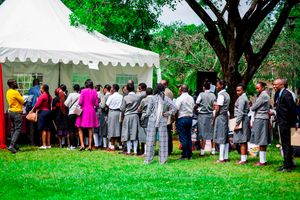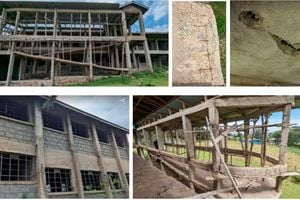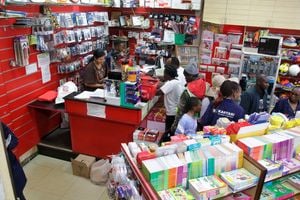
Basic Education Principal Secretary Belio Kipsang with Education Cabinet Secretary Ezekiel Machogu during the release of the 2023 KCPE results on November 23.
Three weeks after learners in Form One started reporting to secondary schools, thousands of needy children are still at home and are on the brink of dropping out completely.
Many of the children and their parents who spoke to the Nation expressed fears that the doors may have been slammed shut with applications for most bursary and scholarship schemes closed.
They accused authorities of leaving them out and extending the much-needed assistance to some undeserving families.
According to data from the Ministry of Education, by Friday last week, there were 1,268,185 learners who had reported to Form One and 131,854 who hadn’t.
The ministry said 5,723 Kenya Certificate of Primary Education (KCPE) candidates have joined technical and vocational education and training (Tvet) institutions.
“There is no cause for alarm,”Education Cabinet Secretary Ezekiel Machogu told Nation. He urged parents who didn’t have school fees to enrol their children at the schools “as they pursue how to get the money.”
For Boutros Gamal Andale, the joy of passing his KCPE exams soon turned into despair. He had attended Emutsuru Primary, a public school in Luanda, Vihiga County, and scored 381 marks out of 500.
This secured him a place Kwale Boys High School, over 900 kilometres away in Kwale County. To reach there, he would need to travel to Kisumu, Nairobi, and Mombasa, an expensive and tiresome journey. He lives with his mother in a church compound as they do not have a home.
Boutros applied for the Equity Wings to Fly, Elimu, KCB and the National Government Constituency Development Fund (NG-CDF) scholarships but was not considered for any of them.
Also Read: The evolution of Kenya’s education system
Through the regional office of the Ministry of Education, he has been transferred to Musingu High School in Kakamega County but he is still struggling to raise the school fees.
The thousands of children who have been unable to join secondary school exposes the inadequacy of the Free Day Secondary Education (FDSE) programme.
The government is meant to fund each learner in a public school at the rate of Sh22,244 per year, but this has reduced to about Sh17,000.
The money is for tuition requirements only. Learners in boarding schools pay extra fees based on the category of the school.
This month, the government released Sh10 billion to the NG-CDF for bursaries. Last week, the National Government Affirmative Action Fund (NGAAF) also received Sh1.5 billion from the National Treasury. Of this, Sh253 million will fund the education of 25,000 needy children.
“County governments also run scholarship programmes and the government has released money to them. There should be no reason why anyone who deserves it should be left out,” Mr Machogu said.
However, the situation on the ground is different as witnessed by the thousands of students who are still at home.
“It is not easy to get these bursaries especially if you don’t know the chiefs and local politicians. They have a lot of control on who benefits,” Mr Mwangi Kagira, a parent from Kiambu County, told the Nation.
This year, 14,426 learners benefited from the Elimu Scholarship programme out of the 95,016 who applied, according to Mr Machogu.
“Parents who have the capacity to keep their children in school without strain comprise a small fraction of our society. The majority lead modest lives but struggle to enrol and retain their children in school," Mr Machogu said during the unveiling of the beneficiaries..
"In this financial year, the government will spend approximately Sh4.5 billion to support a total of 43,000 needy and vulnerable learners across the 47 counties,” the CS explained.
According to the Ministry of Education guidelines, learners in national schools should pay Sh53,554 per year while those in extra-county schools pay Sh40,535.
The government allocates Sh57,974 for learners with special needs while the parents pay Sh12,790.











